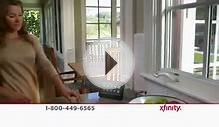
New York, NY – Feb. 11, 2016 – The National Advertising Division has recommended Comcast Cable Communications, LLC, provider of Xfinity Cable Television Service, discontinue one broadcast spot challenged by satellite television service provider DirecTV, LLC, following NAD’s finding that the commercial conveyed the message that DirecTV’s service doesn’t function during any wet weather.
However, NAD found that a second spot conveyed a more narrow message that satellite television service may be susceptible to service interruptions during some types of severe weather, a claim NAD determined was supported by the evidence in the record. NAD also recommended that Comcast modify or discontinue several other claims made in connection with its Xfinity Cable Television Service.
NAD is an investigative unit of the advertising industry system of self-regulation. It is administered by the Council of Better Business Bureaus.
In this case, DirecTV challenged advertising claims that included:
- “Don’t let bad weather get in the way of your entertainment . . . Every time it rains, I’m pretty sure I’m not gonna watch TV . . . With Xfinity, you get crystal clear picture quality, rain or shine.”
- “Don’t get rained out with DIRECTV. Xfinity delivers reliable entertainment—rain or shine.”
- “a storm’s coming. There goes my satellite signal.”
- “Are you a DirecTV customer? You could be getting better service. Choosing Xfinity isn’t a switch—it’s an upgrade.”
- “Best-in-class support.”
- “Guaranteed 2 hour appointment window.”
- “the most live sports.”
- “save energy and save worry with Xfinity Home.”
Following its review of the claims, NAD found that the advertiser’s “Farmers” commercial conveyed the message that satellite television service may be susceptible to service interruptions during some types of severe weather, as well as the message that cable television service does not have the same type of vulnerability.
NAD found that the claims as they appeared in both the “Farmers” commercial and website advertising were supported by the evidence in the record.
However, NAD determined that the advertiser’s “Rain or Shine” commercial conveyed a broader message that the challenger’s satellite television service does not function during any wet weather. NAD found that message was not supported and recommended that the advertisement be discontinued.
NAD determined that confidentially submitted evidence in the record did not support the advertiser’s claim, made in a television commercial and on its website, that it offers the “most live sports.” Accordingly, NAD recommended that it be discontinued or modified to truthfully and accurately tout the breadth of its sports programming available across different platforms.
NAD found that, in the context in which it appeared, the claim that Xfinity provides “better service” amounted to puffery and did not require support. However, NAD determined that the claim “best-in-class support” was an unsupported objective performance claim and recommended that it be discontinued.
NAD determined that the advertiser could properly describe its policy regarding its customer service visit time windows as a “guarantee, ” but recommended that it disclose the material terms of the guarantee in direct proximity to the claim, and not via hyperlink. Finally, NAD found that the advertiser’s “save energy” claim was supported, but to avoid the potential for consumer confusion, recommended that it be modified to make it clear that the claim refers to the savings that consumers can achieve by virtue of the programmable thermostat that is provided as part of the Xfinity home service.
Although Comcast took issue with certain of NAD’s findings, it did agree in its advertiser’s statement “to comply with NAD’s recommendations.”
Note: A recommendation by NAD to modify or discontinue a claim is not a finding of wrongdoing and an advertiser’s voluntary discontinuance or modification of claims should not be construed as an admission of impropriety. It is the policy of NAD not to endorse any company, product, or service. Decisions finding that advertising claims have been substantiated should not be construed as endorsements.
RELATED VIDEO











